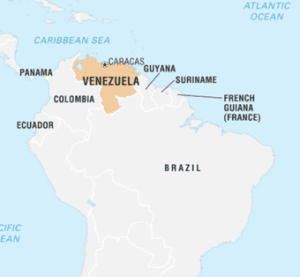TAG: GS 3: ECOLOGY AND ENVIRONMENT
THE CONTEXT: Venezuela, once home to six glaciers, has become the first country in modern history to lose all its glaciers.
EXPLANATION:
- The Humboldt glacier, the last remaining glacier in the country, was reclassified as an ice field after shrinking to an area of less than 2 hectares.
- Scientists had predicted it would last another decade, but it melted faster than expected.
The Decline of Venezuela’s Glaciers
- The six Venezuelan glaciers were located in the Andes mountains at altitudes of about 5,000 meters.
- By 2011, only the Humboldt glacier remained, and now it too has disappeared.
- The rapid melting of the Humboldt glacier was accelerated by the El Niño phenomenon, which leads to abnormal warming of surface waters in the equatorial Pacific Ocean and consequently warmer temperatures in affected regions.

Venezuela
What Are Glaciers?
- Glaciers are large, thick masses of ice formed on land from the accumulation of snow over centuries.
- According to the United States Geological Survey (USGS), glaciers typically form in areas where mean annual temperatures are near the freezing point, winter precipitation leads to significant snow accumulation, and temperatures throughout the year do not completely melt the previous winter’s snow.
- Due to their mass and gravity, glaciers flow like very slow rivers.
- There is no universal consensus on the exact size a mass of ice must be to be classified as a glacier, but a commonly accepted guideline by the USGS is around 10 hectares.
Why Are Glaciers Disappearing?
- Global Warming
- The primary cause of glacier melting is global warming.
- Greenhouse gases (GHGs) like carbon dioxide and methane, released from burning fossil fuels, trap heat in the atmosphere.
- This process, which started intensifying since the Industrial Revolution in the 18th century, has led to a rise in global temperatures by at least 1.1 degrees Celsius since 1880.
- Greenhouse Gas Emissions
- GHG emissions have skyrocketed in recent decades, leading to severe climate impacts such as more frequent and intense heatwaves, floods, droughts, sea-level rise, and glacier melting.
- In the Andes, temperatures have increased by 0.10 degrees Celsius over the past seven decades, contributing significantly to the loss of Venezuela’s glaciers.
- El Niño
- The El Niño phenomenon, which developed in July 2023, exacerbated the melting of the Humboldt glacier.
- This event causes warmer surface waters in the equatorial Pacific Ocean, leading to increased regional temperatures.
- In Venezuela’s Andean region, some months saw temperature anomalies of +3°C to +4°C above the 1991-2020 average, an exceptional rise for tropical latitudes.
The Global Context
- Venezuela is not alone in facing glacier loss.
- Glaciers worldwide are shrinking and disappearing faster than researchers predicted.
- A 2023 study projects that two-thirds of global glaciers could melt away by 2100 if current climate change trends continue.
- India, for instance, risks losing up to 80% of its glacier volume in the Hindu Kush Himalayan Mountain ranges this century without significant reductions in GHG emissions.
Impacts of Glacier Loss
- Freshwater Sources
- Glaciers are crucial freshwater sources, especially during hot and dry periods.
- Their disappearance forces communities to rely entirely on spot rainfall for freshwater.
- Aquatic Ecosystems
- Glacial runoff provides cold water necessary for many aquatic species, maintaining downstream water temperatures.
- The loss of glaciers threatens these species, disrupting the food web.
- Sea-Level Rise
- Melting glaciers contribute to rising sea levels.
- While the Humboldt glacier did not have enough ice to significantly impact sea levels, larger glaciers like those in Greenland and Antarctica are major contributors to global sea-level rise.
- Cultural and Economic Impact
- For Venezuela, the loss of its glaciers is a significant cultural blow.
- Glaciers were integral to the region’s cultural identity and supported mountaineering and tourism activities.
- According to ecologist Luis Daniel Llambi, this cultural loss is profound for the South American country.




